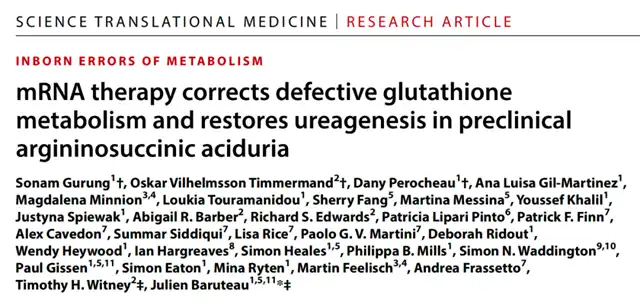mRNA Therapy Shows Promise in Treating Rare Genetic Liver Disease
- Normal Liver Cells Found to Promote Cancer Metastasis to the Liver
- Nearly 80% Complete Remission: Breakthrough in ADC Anti-Tumor Treatment
- Vaccination Against Common Diseases May Prevent Dementia!
- New Alzheimer’s Disease (AD) Diagnosis and Staging Criteria
- Breakthrough in Alzheimer’s Disease: New Nasal Spray Halts Cognitive Decline by Targeting Toxic Protein
- Can the Tap Water at the Paris Olympics be Drunk Directly?
mRNA Therapy Shows Promise in Treating Rare Genetic Liver Disease
- Should China be held legally responsible for the US’s $18 trillion COVID losses?
- CT Radiation Exposure Linked to Blood Cancer in Children and Adolescents
- FDA has mandated a top-level black box warning for all marketed CAR-T therapies
- Can people with high blood pressure eat peanuts?
- What is the difference between dopamine and dobutamine?
- How long can the patient live after heart stent surgery?
mRNA Therapy Shows Promise in Treating Rare Genetic Liver Disease
Rare diseases, often caused by errors in a patient’s DNA, affect approximately 300 million people worldwide. However, less than 5% of rare diseases have approved treatment methods. Most of these treatments use gene therapy to replace defective genes and alleviate the disease. However, traditional gene therapies utilize viral vectors for gene delivery, which may lead to severe side effects, including immune system reactions from the patient. Combined with the high cost of gene therapy, this makes widespread adoption challenging.
Argininosuccinic aciduria (ASA) is a rare genetic metabolic disorder caused by a deficiency of the urea cycle enzyme argininosuccinate lyase (ASL). ASL is crucial for detoxification in the liver, and its deficiency leads to the accumulation of toxic ammonia in the blood. During the COVID-19 pandemic, mRNA technology revolutionized the field of vaccines, and now it shows promising potential in treating rare diseases and cancers.
On January 10, 2024, researchers from University College London, King’s College London, and Moderna collaborated to publish a study titled “mRNA therapy corrects defective glutathione metabolism and restores ureagenesis in preclinical argininosuccinic aciduria” in the Science Translational Medicine journal.
The study developed an mRNA therapy using lipid nanoparticles (LNPs) to deliver mRNA encoding argininosuccinate lyase (hASL-mRNA) in mice models, effectively treating a rare genetic liver disease called argininosuccinic aciduria. The treatment corrected glutathione metabolism defects and restored urea synthesis, demonstrating the potential application of mRNA technology in human disease treatment.

The research team aims to conduct human clinical trials in the coming years. Currently, Moderna is already involved in clinical trials for mRNA therapies targeting other genetic metabolic diseases, including propionic acidemia and methylmalonic acidemia.
In this study, the researchers explored the feasibility of using mRNA technology to treat argininosuccinic aciduria. The therapy utilized LNPs to deliver mRNA encoding argininosuccinate lyase (hASL-mRNA) to improve glutathione metabolism abnormalities and chronic liver disease caused by ASL deficiency. The treatment was tested on 31 mice, including neonatal mice with the disease and adult mice in the late stages of the disease. Untreated mice were used as a control group.
During the treatment, mice underwent positron emission tomography (PET) scans to non-invasively track the correction of glutathione regulation and therapeutic effects of mRNA therapy.
Results showed that hASL-mRNA therapy corrected the phenotype of both neonatal and adult ASL-deficient mice, enhancing urea production and improving the fatal consequences of argininosuccinic aciduria. All mice born with the disease died within the first two weeks of life, while those receiving mRNA therapy at birth survived for over three months. Additionally, seven elderly mice treated with mRNA therapy as a rescue treatment had six survivors, whereas all untreated elderly mice died.
For mice, the benefits of each mRNA treatment lasted only about seven days, with treatments administered weekly for eight weeks. However, the research team anticipates that mRNA treatments for human patients will allow for longer treatment intervals.
The study demonstrates the unprecedented therapeutic potential of mRNA technology for currently untreatable genetic diseases, particularly in liver diseases. The team aims to apply this approach to other genetic liver diseases and advance mRNA therapy to human clinical trials.
Dr. Paolo Martini, Chief Scientific Officer of Moderna’s International Therapeutic Research Center, stated that this collaboration showcases the synergy between academia and industry in exploring mRNA technology against rare diseases, potentially bringing treatment options for severe and debilitating conditions like argininosuccinic aciduria.
Link to the paper: https://www.science.org/doi/10.1126/scitranslmed.adh1334
mRNA Therapy Shows Promise in Treating Rare Genetic Liver Disease
(source:internet, reference only)
Disclaimer of medicaltrend.org
Important Note: The information provided is for informational purposes only and should not be considered as medical advice.



